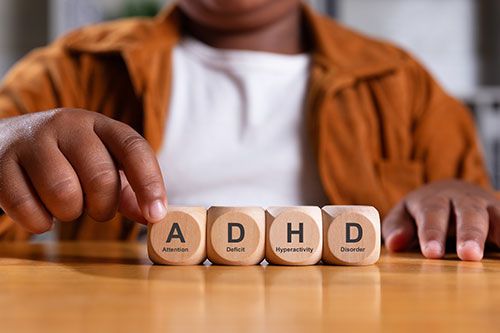ADHD can involve challenges with executive function: planning, organizing, staying focused, and finished tasks. As the parent, you can help your child gain these skills so you can both feel less overwhelmed, frustrated, exhausted, and angry and more in control. Helping your child involves patience, empathy, and support, and your help can improve family dynamics. When your child with ADHD doesn’t follow instructions, makes others wait, doesn’t clean up after themselves, or demands attention, their siblings may not get the attention they need or blamed for their siblings’ behavior under their watch, creating resentment.
But there’s hope. With compassion and structure, you can manage your child’s ADHD for your family:
1. Stay calm and focused. Keep a sense of humor and your expectations for your child accomplishing tasks low. Trust that your child’s behavior will improve. Prioritize your own self-care so you can model a healthy lifestyle. Get support and take care of yourself with exercise and healthy eating.
2. Create a routine. Kids need predictable structure around eating, homework, play, and sleep. Structure is especially helpful for kids with ADHD since it helps them feel in control. Make sure your kid has quiet places with few to no distractions, and use timers to create structured time. Keep your home organized so avoid frustration in finding what your child needs. Keeping your child busy (but not too busy) may help them avoid distractions. Keeping eating structured can prevent binge eating. Focus on heathy food.
3. Get exercise and sleep. Exercise burns off energy and lead to better sleep, which can improve symptoms of ADHD. Fast-paced sports, martial arts, and yoga work best. Exercise in nature also helps. To get better sleep, have a routine, early bedtime, decrease screen time, increase exercise and activity time, restrict caffeine, and find ways to calm your child before bedtime (reading, cuddling, and calming scents and music).
4. Create and enforce rules. Display rules your child has the ability to follow. Give rewards and consequences. Positive reinforcement can go a long way. Use privileges and praise and change them up. A reward chart can help. Make rewards immediate when possible, and always deliver. Consequences, such as removal of privileges, should also be immediate and expected. When your child violates a rule, ask them what they could have done instead, and remove them from situations that won’t set them up for success.
5. Help your child make friends. Teach them social cues and how to take turns talking without interrupting. Role play with your child and reward behaviors you witness.
6. Ignore attention-seeking behavior. Show your child they will not get your attention with negative behavior. Turn away or walk away from inappropriate seeking of attention.
7. Make one-on-one time. Show your child you love them by setting aside time to spend with them.
While ADHD can present challenges, it can be manageable by tending more mindfully to what all kids need: compassion, structure, rules, exercise, sleep, a healthy diet, and support.
Deb Falzoi
trauma, therapy, adhd, emdr, ptsd, grief, loss, sad, bullying, school, feelings, therapist, worcester, holden, shrewsbury, work, stress, anxious, anxiety, childhood, boundaries, addiction, relationship, coping, boston, anxiety, depression, adoption, west boylston, rutland, paxton, boylston, clinton, sterling, princeton, hubbardston, lancaster, central massachusetts, massachusetts

